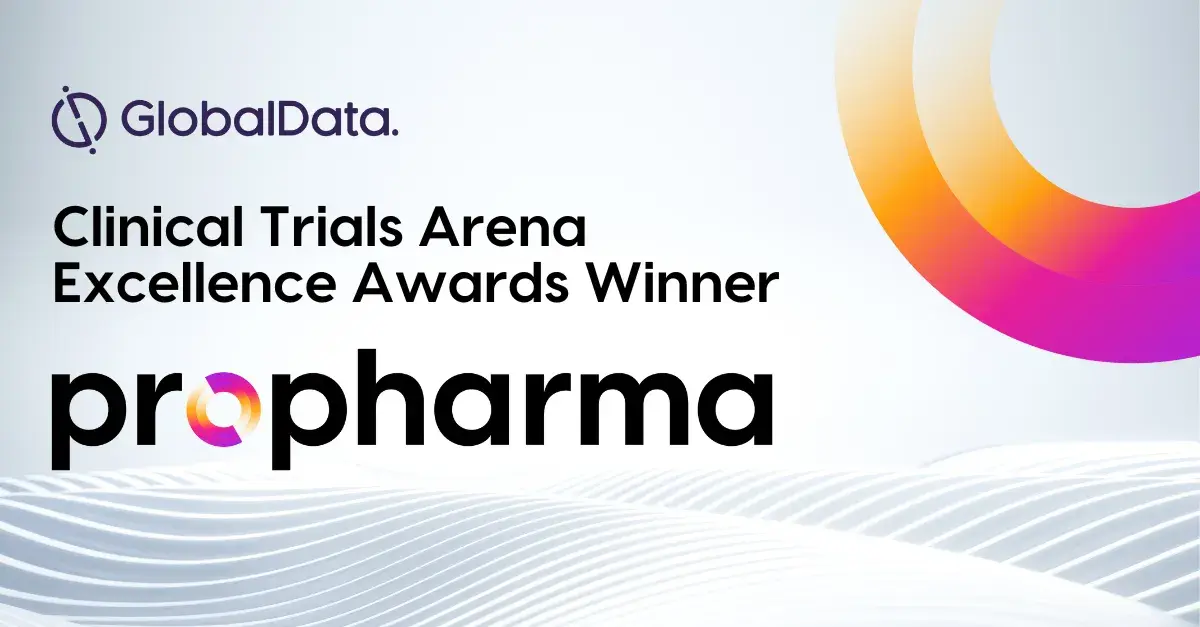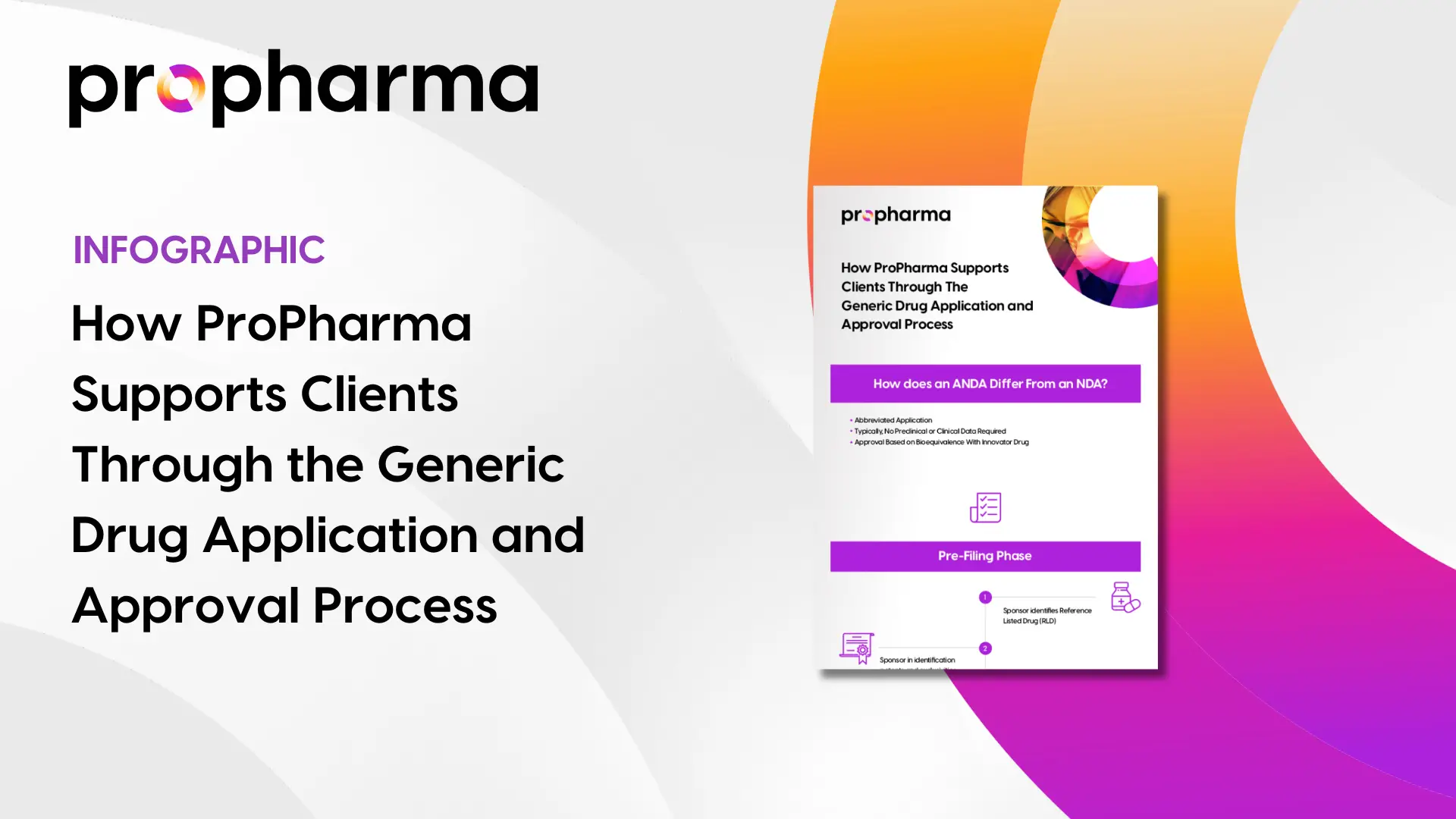new drug application (NDA) submissions
505(b)(1) or 505(b)(2)


There are clearly defined pathways that define how a along which a drug can be approved. Deciding on the appropriate regulatory pathway for your drug development program is a process that requires an understanding of the content and purposes of sections 505(b)(1) and 505(b)(2) of the Federal Food, Drug, and Cosmetics (FD&C) Act. It also is the reason we frequently start assignments with a regulatory strategy – what may seem obvious often is not. ProPharma has assisted in the development of hundreds of drugs and biologics. For many of our clients, we have started with them in early development and continued on through product approval and beyond.
We are the leading regulatory consulting firm in the world. Our combination of industry, government and consulting experience is unmatached and our track record of success is recognized as best in class.
The 505(b)(1) Regulatory Pathway
The 505(b)(1) pathway is used by Sponsors to obtain the approval of a new drug whose active ingredients have not previously been evaluated and approved by FDA. As you can imagine, this type of submission requires extensive research, including both clinical and nonclinical studies, demonstrating the product's safety and efficacy for the indication being sought. Because of the substantial amount of research and data that is required, 505(b)(1) NDA submissions can take many years to complete and require a significant amount of resources to get approved. The key to development for this route is the ability to move logically from one step to the next.
The 505(b)(2) Regulatory Pathway
The 505(b)(2) regulatory pathway is another type of NDA submission that can be used to obtain market approval. This type of submission differs from the 505(b)(1) NDA in that the product in question contains identical active ingredients as to a previously approved drug. As such, the data included in the submission can rely, at least partially, on the Agency's findings of safety and effectiveness related to another product.
For example, if a Sponsor reformulated a previously approved drug so that it can be taken as a liquid form instead of as a tablet or capsule, the company could use the 505(b)(2) pathway to minimize the amount of original data it would need to submit in support of its new drug. Further, this type of submission is commonly used for previously approved drugs being used for a new indication. The FDA can rely upon existing data showing that the reference drug is safe and effective, allowing the Agency to focus its attention on determining whether the changes made to the new drug alter its safety or efficacy.
Sponsors taking advantage of the 505(b)(2) regulatory pathway can experience a shorter drug development program that requires fewer resources than the 505(b)(1) regulatory pathway.
Choosing the Appropriate Regulatory Pathway
When deciding which regulatory pathway is best for your NDA submission, the following questions should be considered:
- Does the product consist of a New Chemical Entity (NCE)?
- Is the product a new or novel formulation?
- If it is an existing product, is it a new route of administration?
- Does any published literature exist?
While this is by no means an all-inclusive list, answering these four questions will help you determine which regulatory pathway is most appropriate for you and your product, which is a critical step in developing and submitting an NDA.
If your regulatory strategy guides you down the 505(b)(1) route, you must develop an application that includes all information necessary to prove the safety and efficacy of your novel active ingredient. This process will take time, and guidance and supporting information will need to be generated through clinical studies.
If, however, your regulatory strategy guides you down the 505(b)(2) route, your time to market will likely be shorter because you can rely, in part, on data from existing reference drugs.
Whichever route you take, it is important to know that the standard of approval is the same. All NDAs are judged with a risk-benefit analysis that doesn't change because the source of the data supporting the analysis is different.
Partner with us!
Benefits of Having a Regulatory Consultant
Choosing the right regulatory pathway is critical to the success of your submission. It is of the utmost importance that you take all precautionary measures to ensure that you are headed in the right direction. We can help you do this. ProPharma has significant experience in helping our clients determine the most appropriate regulatory pathway and then working to develop and submit the application to the FDA.
Using our unique approach that combines vast regulatory experience with a deep scientific knowledge, we have had overwhelmingly high success rates when dealing with the Agency. By partnering with us, some of the benefits you will receive include:
- Experience: We have been working directly with the FDA for more than 30 years
- Knowledge: We know what is required to achieve a successful interaction with the Agency and are uniquely qualified to work with you in preparing and submitting an extraordinary submission
- Diversity: Our team of scientific and regulatory experts specialize in a variety of disciplines and stay abreast of changing trends and current events within the industry. Thus, we can bring a unique and extensive range of knowledge and experiences to the table, which is exactly what is needed to develop an application that will be successful
Regardless of which regulatory pathway fits your development plan best, we'll be there to ensure that your discussions with the FDA are properly framed to fit the chosen pathway and guide your product through the approval process.
Expert Guidance for 505(b)(1) and 505(b)(2) Submissions
After developing your regulatory strategy, you will know which NDA pathway – 505(b)(1) vs. 505(b)(2) – to use to take your product to market. For those taking the 505(b)(1) route, ProPharma will help you develop your application, including all information necessary to provedemonstrate the safety and efficacy of your new active ingredient. This process will take time and guidance, and supporting information will need to be generated through clinical studies.
On the other hand, if you are planning to submit a 505(b)(2) application, our staff will work with you to ensure your product only differs from an approved drug in the following ways:
- Dosage form
- Strength
- Route of administration
- Substitution of an active ingredient in a combination product
- Formulation
- Dosing regimen
- Active ingredient
- New molecular entity
- Combination product
- Indication
- Patient population
- Rx/OTC monograph
- Naturally derived or recombinantsynthetic active ingredient
- Bioequivalence
Afterward, we will guide you through the entire 505(b)(2) application, using our vast knowledge of and experience with the FDA to create a seamless filing process.
Abbreviated New Drug Application (ANDA) Submissions
What is an ANDA?
Your generic drug development program has been relatively simple to this point. However, before filing your Abbreviated New Drug Application (ANDA) with the Food and Drug Administration (FDA), you must be positive that your product is identical (bioequivalent) to the innovator drug product (the Reference Listed Drug). This means your product must match the innovator in:
- Dosage form
- Strength
- Quality
- Performance characteristics
- Intended use
- Route of administration
ANDA Consulting Expertise
After determining that your product meets these requirements, ProPharma Group will review all relevant documentation and work with you to develop an ANDA filing plan that balances risk, speed to approval, and cost. We will then produce your ANDA submission, completing all relevant modules. For each module, we will:
- Determine the required content
- Examine the content for suitability
- Edit/write/translate as necessary to complete the module
We will compile and edit the completed ANDA, ensuring it is of sufficient excellence to meet the FDA's rigorous standards and is thus ready for submission. When the document is finalized, we will convert it to the Electronic Common Technical Document (eCTD) format, so it is ready to be filed electronically with the FDA. If requested, ProPharma Group may also act as your Agent and submit the finished ANDA in eCTD format to the FDA.
News & Insights

April 14, 2025
The Role of the Local Person Responsible for Pharmacovigilance (LPPV) in the DACHL Region
Learn about the role of the Local Person Responsible for Pharmacovigilance and compliance requirements in Germany and Austria for pharmaceutical companies.

April 10, 2025
Success in the European Pharmaceutical Market: Part One
Explore key steps to successfully enter the European pharmaceutical market, including navigating regulatory frameworks, ensuring quality compliance, and obtaining Wholesale Distribution Authorization.

January 31, 2025
ProPharma Recognized for AI Excellence at ECCCSA
ProPharma wins Silver at ECCCSA for AI innovation in Medical Information, enhancing efficiency and quality in delivering accurate medical information.

October 21, 2024
ProPharma Appoints Brian Tuttle as Chief Financial Officer
ProPharma appoints Brian Tuttle as CFO to drive financial strategy and accelerate global growth, leveraging his 20 years of life sciences industry experience.

January 31, 2025
ProPharma Recognized for AI Excellence at ECCCSA
ProPharma wins Silver at ECCCSA for AI innovation in Medical Information, enhancing efficiency and quality in delivering accurate medical information.
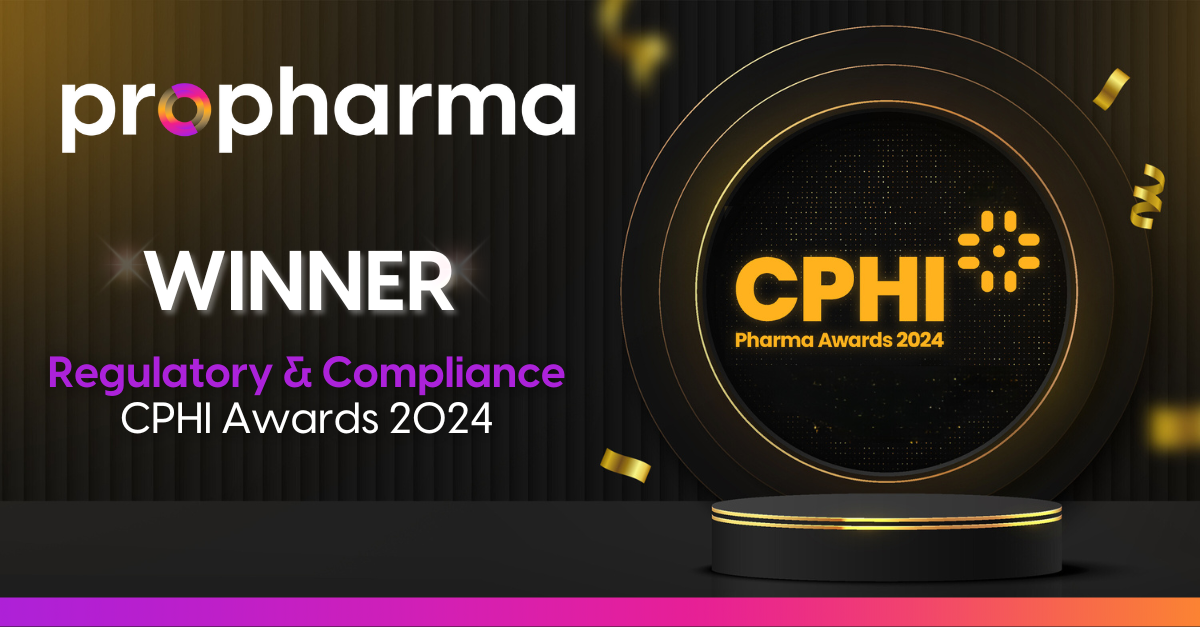
October 9, 2024
ProPharma Receives 2024 CPHI Regulatory and Compliance Award
ProPharma wins CPHI Pharma Award for excellence in regulatory and compliance innovation, enhancing efficiency and accelerating market access for life-saving therapies.
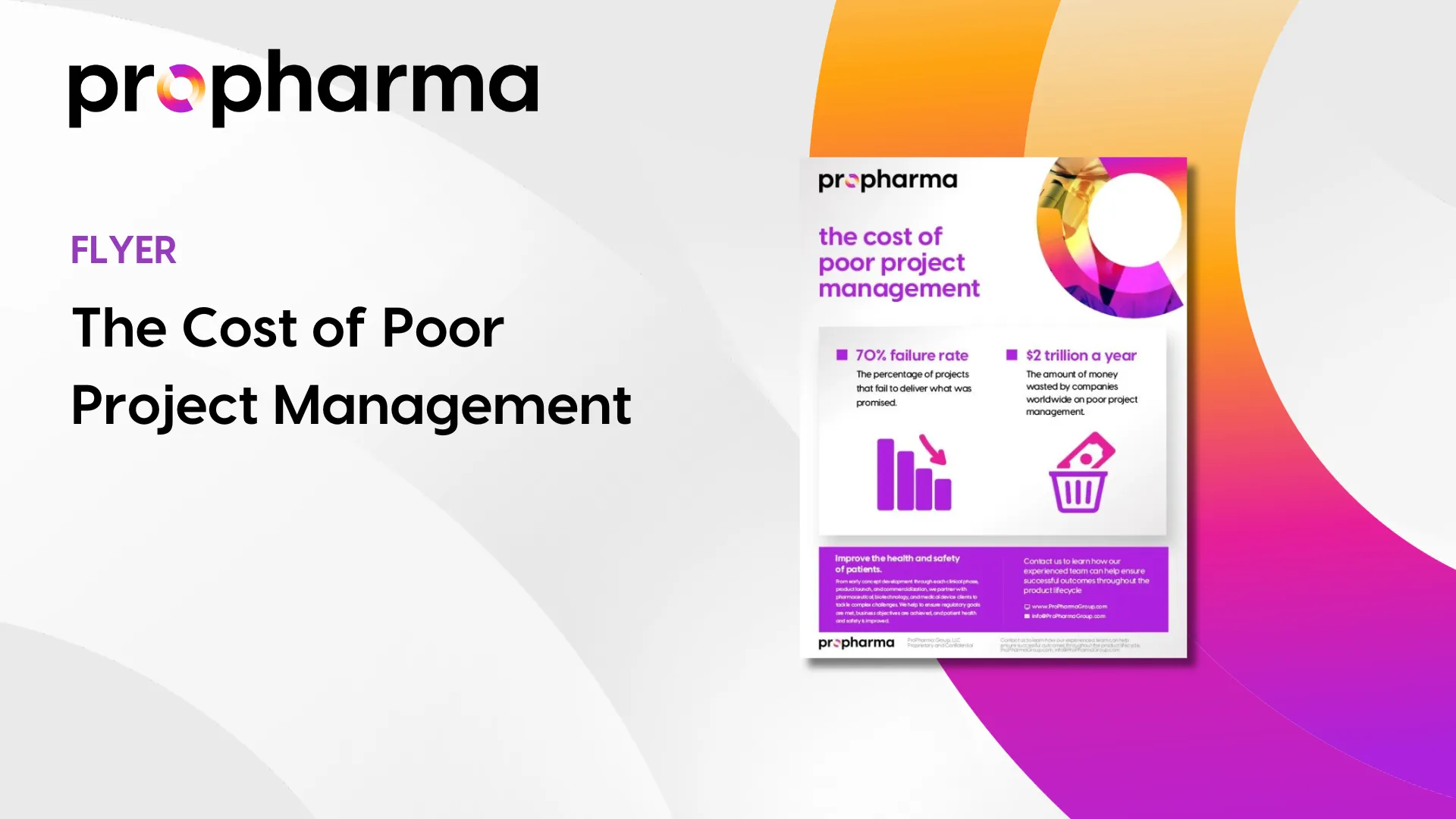
June 10, 2022
The Cost of Poor Project Management
Project Management isn’t for the faint of heart. There is a shockingly high rate of project failure… but on the other hand, great project management can be a key differentiator that leads a company...
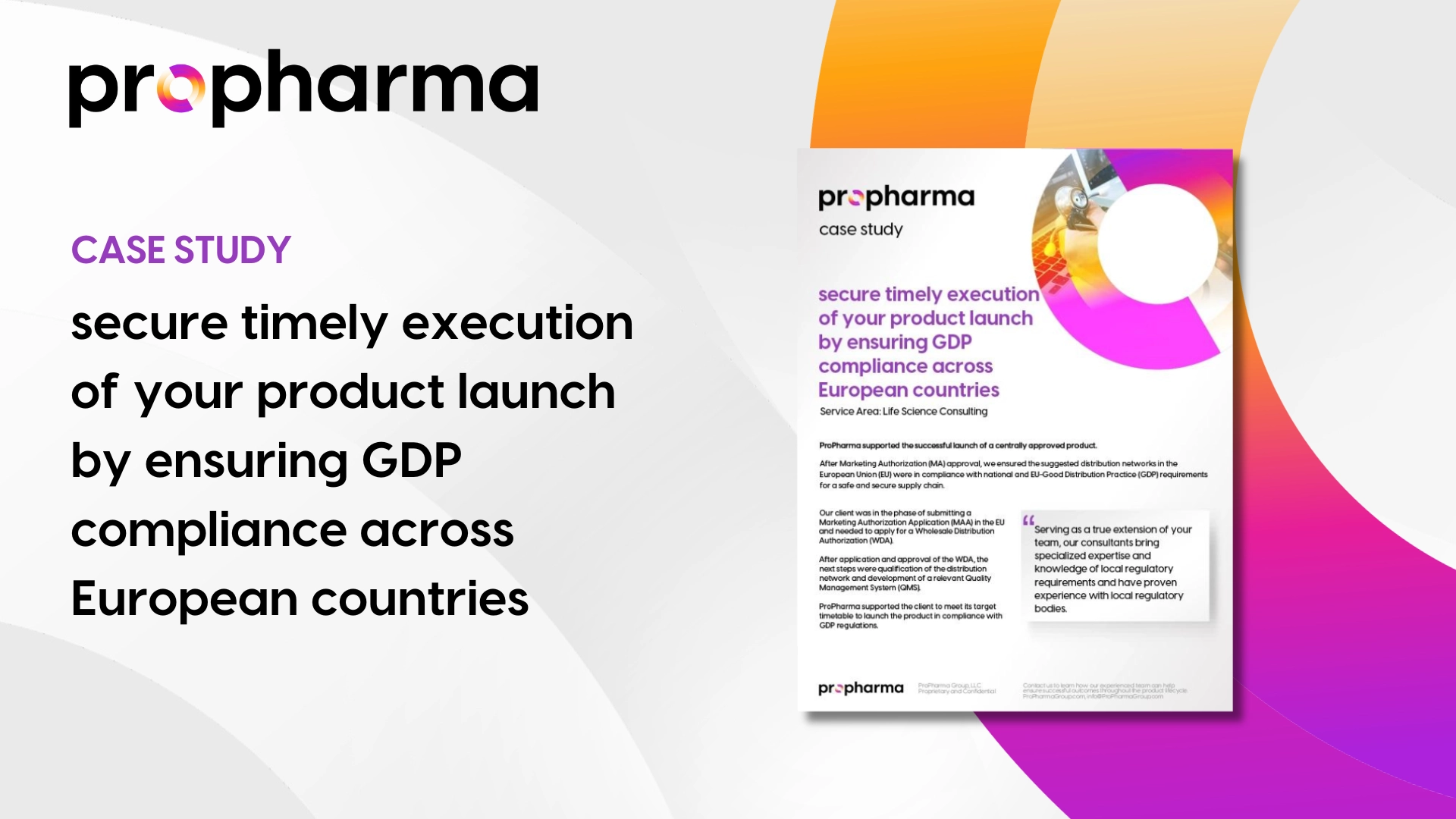
August 31, 2022
Successfully Passing MHRA Inspections for Overseas Manufacturing Sites
ProPharma offers GMP and GDP compliance services from clinical development to commercial distribution of the products' lifecycle. ProPharma’s Compliance and Quality team completed the first on-site...
News & Insights

